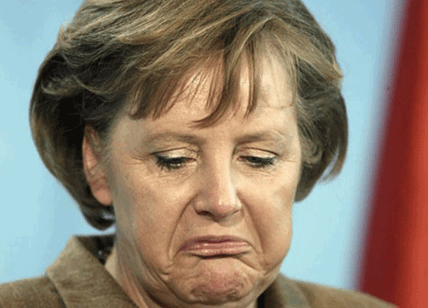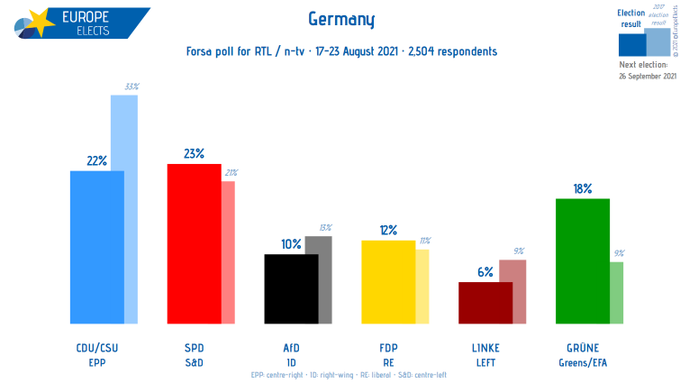At this moment the CDU (and the EPP) are finished


The month of September will be decisive for much more important issues than the municipal ones in Rome and Milan. In the US, the moderate and radical Dems are fighting over the infrastructure law, to be closed by 1 October, and the balance in the party will depend on this. But the big game is in Europe. On September 26, the Germans will go to the polls to elect a new parliament and, finally, a new chancellor. After nearly sixteen years at the helm of Europe's largest economy, and having had to work with the likes of Sarkozy, Berlusconi and Trump, the immaculate Angela Merkel will finally leave room for a successor.
Until July the race seemed closed, with a strong advantage of the Christian Democrats of the CDU / CSU, but later this advantage melted like snow in the sun. Merkel's would-be successor, Armin Laschet, failed to garner any enthusiasm among his own constituencies, let alone the rest of the German electorate. His public profile even worsened in mid-July after he was filmed laughing as the German president spoke at the scenes of the devastating floods in West Germany. Correlation is not causation, so they say, but from the blunder onwards, polls have tightened considerably.
As the political agenda of any new coalition will be shaped by broad negotiations, requiring concessions on the core interests of the participating parties, personality is more important than political ideas at this juncture. On that front, it's not going well for the CDU / CSU. In the hypothetical scenario of a direct vote by the chancellor, Laschet should only get 16% of the votes, according to this recent infratest-dimap poll. He is a surprisingly small figure, fomenting divisions within the Union, as the CDU is commonly called. Also note here that the leader of the Greens, Ms Baerbock, turns out to be an endangered star rather than a shooting star, as she would only get 12% of this vote. His choice was also wrong.
The remaining 72% of these hypothetical ballots obviously have to end somewhere; the surprising news here is that at least one of the nominees has finally managed to become more popular than the half-notches chosen by the others. This turns out to be Olaf Scholz, the leader of the Social Democrats who is currently Merkel's federal finance minister and her deputy chancellor.
He is characterized in fact as the most experienced Kanzlerkandidat, as the one who was able to guide Germany through the most turbulent times. This idea seems to appeal to voters and, having worked so closely with Merkel that she actually begins to imitate her, it is seen as the "competent choice". This is once again confirmed by the aforementioned poll, which finds that even supporters of the liberal FDP prefer Mr. Scholz to Mr. Laschet.
The SPD's gap with the CDU / CSU has narrowed since mid-July, but for the first time in fifteen years, a Forsa poll now sees the SPD (23%) ahead of the CDU / CSU (22%), while opening a gap with the Greens (18%) and the FDP (12%). The AfD could get 10% and the Left 6%.

This opens up a whole series of three-party coalitions, including the much vaunted "traffic light" which is made up of SPD (red), FDP (yellow) and Greens. Although the parties of this coalition would have to bridge many ideological differences on fiscal, foreign and environmental issues, this would end the reign of the Union and reflect the structural decline of Christian democracy in Western Europe. After all, the Black-green alternative that would have more in common?
The wide spread of votes across the political spectrum translates into many coalition possibilities, which must be explored without the authority of an incumbent fort. It is therefore simply too early to say what exactly a "traffic light" would mean for markets; the appointment of ministers will be a key factor in seeing which policies will become accentuated (e.g. how the Ministry of Finance and the Ministry of Foreign Affairs are divided between the Greens and the FDP) while some 'red lines' must be crossed to make it work (e.g. For example the Greens and the SPD advocate changes to allow for more public investment, but this will be moderated by the FDP which supports the idea of the "small government", which * still * believes that a government finances itself as a family; or, the Greens they would like a tougher stance on Russia and China, but the FDP will be on the lookout for the strong German economic lobby). Surely the backlash would be there, and strong, in Europe, to the European parliament: the exit of the CDU from the coalition would lead to the contestation of its role and that of Von Der Leyen, its direct expression.
We will see what happens in a month.

Thanks to our Telegram channel you can stay updated on the publication of new articles of Economic Scenarios.
The article In this moment the CDU (and the PPE) are finished comes from ScenariEconomici.it .
This is a machine translation of a post published on Scenari Economici at the URL https://scenarieconomici.it/in-questo-momento-la-cdu-ed-il-ppe-sono-finiti/ on Thu, 26 Aug 2021 06:00:00 +0000.
